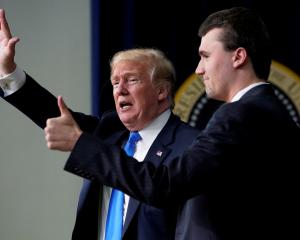To borrow the immortal words of Australian politician Bill Hayden, some might argue National could have put up the proverbial drover's dog as leader and still won last month's election, such was its huge lead in the polls over preceding months.
Maybe so.
However, the history books should record the 2008 election result as a personal triumph for John Key.
Mr Hayden's sour-grapes remark was directed at Bob Hawke, who snaffled the leadership of the Australian Labor Party off him just hours before the Liberals called an election they were bound to lose.
In contrast, Mr Key was leader for two years before securing a victory the scale of which is disguised by the proportional voting system.
Had the election been fought under the pre-1996 first-past-the post system, the outcome would have been of the landslide proportions of Sir Robert Muldoon's stunning victory in 1975 and Jim Bolger's similar rout of Labour in 1990.
That achievement alone elevates John Key into a select group of National Party leaders. There can be no other choice for politician of the year.
Winning elections is what it is all about.
But Mr Key has reinforced his claim to the title through the ease and confidence with which he has taken on the mantle of prime minister.
His opponents and critics had predicted he would falter as leader of the opposition, wilt under the pressures of an election campaign, and fail as prime minister simply through lack of experience.
Wrong, wrong and almost certainly wrong again. Labour made leadership a major election issue, if not the issue.
That theme played heavily in Labour's advertising, which promoted a white-jacketed Helen Clark - the white designed to express renewal and freshness - and painted Mr Key as some confused and inconsistent klutz.
Instead, Mr Key radiated more and more confidence and competence as the campaign progressed.
He put the supposedly "unloseable" election completely beyond Labour's grasp.
The speed in forming the new Government and the heady pace since in implementing parts of National's 100-day action plan indicate a prime minister who knows what he wants to do - and, just as importantly, what he doesn't.
That wasn't entirely clear before the election. It is much clearer now. He will be decisive. But that decisiveness may not be utterly consistent.
What matters to Mr Key is whether something works or not - and not whether it is consistent with some long-time National Party shibboleth or public service practice.
What also matters is that Mr Key speaks for a new generation, which entered Parliament in force at last month's election - a generation which is similarly less hidebound by ideology or consumed with refighting the battles of the 1980s or the 1990s.
This is a generational shift in politics of huge proportions. The baby-boomers are on their way out.
Winston Peters has gone. Miss Clark and Michael Cullen are poised to check out.
The new generation has never experienced a wage-price freeze, fixed exchange rates, Think Big or farmers being subsidised according to the number of sheep on their farms.
The new generation has only a hazy memory of the Labour government which swept all that away in a revolution of reform before imploding.
Seeing him in Parliament, those younger MPs must view Sir Roger Douglas as a historical relic from another age.
Mr Key's advantage is that his age and political freshness place him at the vanguard of the new generation - something that cannot be said for the new Labour leadership.
Phil Goff' is another classic baby-boomer. For all his vast experience and all-round skills, he needs to reinvent himself.
He is too one dimensional. He is going to have to stop lecturing and start inspiring.
He has to convince people he is more than a stop-gap leader, and do so before the Shane Joneses and the David Cunliffes of this world or whoever rises to the top of Labour's new intake start getting interested in things beyond the confines of their shadow portfolios.
Peter Dunne is another baby-boomer who nearly got the chop.
His ditching of Labour and swinging United Future's support behind a National-led government in the middle of the election campaign was the cleverest political move of the year, if not the most edifying one.
He got to keep his ministerial job - and quite likely saved losing his Ohariu seat as National voters could safely vote for him, knowing he would back their party to form the next government.
However, Fortress Dunne is no longer impregnable. The seat could fall to Labour next time.
The other smart moves this year came from Mr Key, the first in ruling out Sir Roger for any ministerial post in his Government.
Mr Key has been given a strong mandate by voters. But it is more a mandate for not changing things.
It is certainly not a mandate for the kind of tax cuts, privatisation of government services and cost-cutting across the public sector that Sir Roger espouses.
Mr Key may allow Act New Zealand to do things around the fringes, but there is no way he is going to let Rodney Hide or Sir Roger dictate the Government's direction.
Sir Roger is partially responsible for the destruction of one government. Mr Key is not going to risk it happening a second time on his watch.
National's sheer strength of numbers meant Mr Hide had to accept this decision. Act had nowhere else to go bar another three years on the opposition benches.
Far more courageous was Mr Key's refusal to work with Winston Peters. It could have backfired disastrously.
However, Mr Key felt he was left with no option following Mr Peters' appalling performance surrounding wealthy expatriate Owen Glenn and donations to NZ First.
Mr Key wanted his administration to be a clean break from the past. Having Mr Peters on board would have tainted it from the beginning - as well as possibly harbouring the seed of its destruction.
As for Mr Peters, his career is material for some kind of Shakespearean tragedy or the psychologist's couch - or both.
NZ First - a party built solely around a personality cult - will not be back. Mr Peters will be missed. The charming, generous, understanding Mr Peters, that is.
Not the cantankerous, argumentative, frustrating and difficult creature with whom other parties were forced to do business, smiling benignly as they did so but at the same time looking about as comfortable as someone lying on a bed of sharpened nails.
•This is the final politics page for 2008.
John Armstrong is The New Zealand Herald political correspondent.










